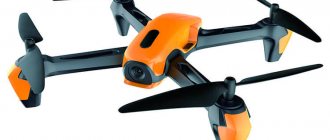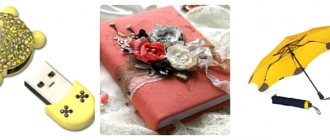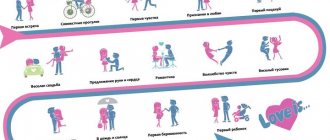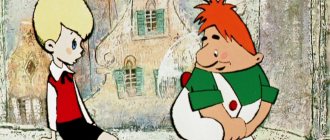Collection of indoor games
PLAYING WITH CHILDREN INDOOR
Living - non-living
The presenter names living and inanimate objects mixed together, and the children answer in chorus only “living”, and are silent when they answer “inanimate”. The children who make the fewest mistakes win.
Line
Children line up in one line in the direction of the leader's hand. When he speaks in all directions, everyone runs away. And when they heard the chant: “The guys have strict order, tra-ta-ta, tra-ta-ta, they know all their places,” they run and line up in a new direction. The latter is considered the loser.
Find the color
Children stand in a circle and, at the leader’s command, look for objects of the named color in order to touch them. The loser is the one who touches the desired thing last. He is out of the game.
Predator
All children are fish, one of them is a predator. When an adult shouts: “Ship,” the fish take cover against one wall, when they shout “Storm,” they take cover at the other, and when the word “predator” is heard, they begin to flee, while the predator reveals itself and begins to catch them.
Sunny bunnies
This activity is suitable for sunny weather. You should take a small mirror, let sunbeams onto the walls and ceiling and watch them together with your baby. Runners are jumping - Sunny bunnies. We call them, but they don’t come. They were here - and they are not here. Jump, jump around the corners. They were there - and they are not there. Where are the bunnies? Gone. Haven't you found them anywhere? (A. Brodsky)
Listen
The leader whistles, signaling the blindfolded players and changing their direction. Focusing on the sounds, you need to find an adult.
Items
Children bring some small objects with them and put them in one place. Next, choose one of the players to stand with his back to the objects. The presenter, pointing to one of the items, asks: “What should the person who owns this item do?” All players see this object, but one has his back to it and does not know whose object the leader is pointing to. This player's job is to assign "fines", a task that the owner of the item must complete in order to redeem the item.
Through the hoop
The player holds a racket with a table tennis ball in one hand, and a gymnastic hoop in the other. The player’s task is to pass the hoop through himself from top to bottom, then from bottom to top, without dropping the ball. They play in pairs. The one who completes the task faster wins.
Arithmetic cubes
To play you need 3 dice. Everyone throws them 3 times. If among the dropped numbers there are identical ones, they are added up (for example, 3, 5 and 3 are dropped, playing the sum 3+3=6, and if all different numbers are dropped, say 5, 2 and 3, they are not taken into account). If it happens that after the next throw all 3 numbers turn out to be the same (for example, 4,4 and 4), then the sum of these numbers also doubles. The winner is the one who, after three throws, ends up with the largest sum of numbers.
Clothespins
Players need to find and collect all the clothespins in the room. Clothespins can be different: plastic, wooden, colored, transparent, old, new. The main principle: the more, the better. The players are divided into pairs. The couple is given a headband with clothespins. The task is very simple. One child blindfolds himself. Clothes pins are attached to the partner's clothes. Moreover, those around them hang up the clothespins, not the child himself. Where to attach them is up to them to decide. The player has no right to interfere in the process. Next comes the time for the player to act blindfolded. His task is to find and remove all the clothespins from the player as quickly as possible.
Funny pictures
A game for developing visual memory. Invite your child to carefully look at 10 pictures, each of which depicts a familiar object. Then ask your child to name the items he remembers one by one. The number of items that the child remembers is important. Show your child pictures that he did not name. Please try again in 10 minutes. Offer to remember all the pictures in an hour.
Get the town
Participants in the game take a toes-and-fives stance, with their hands clasped behind their backs (the hand of one hand grabs the wrist of the other). When squatting, he must, without moving from his place and without touching the floor with his hands, lift the town (puck, cube, cone, etc.) located behind his leg. The winner is the one who succeeds the most times out of three attempts.
Find the bunny
To play you will need a clean handkerchief. You should take it by its 2 adjacent ends, look behind it on both sides and ask: “Where is our bunny? Where did he run off to?" After this, you need to tie the ends of the scarf into knots so that they look like bunny ears, and say: “Here comes the bunny! Where is his tail? At the remaining end of the scarf you need to tie a small knot-tail: “And here is the tail! Let's pet him."
gold fish
The child is a goldfish who offers the fisherman his wish. You come up with something supernatural, and he must find a good reason why he cannot fulfill your desire. Then you can switch roles.
Damaged fax
Participants sit in a row one after another. The last participant draws a picture on the back of the person sitting in front of him. The player who receives the message must repeat it as accurately as possible on the back of the person sitting in front. The first player in the row, having received the message, draws it on paper. After this, the drawings of the first and last players are compared and it is revealed which participants in the game the fax failed on. Before the next round, all players must change places. Geometric shapes, letters and small words, various symbols (dollar sign, euro, ampersand, copyright) can be used as drawings. It is advisable to start the game with simple geometric pictures. To make the game more dynamic, you can prepare drawings for transmission in advance, secretly from the participants in the game. You can play a team version of the game - all participants are divided into teams of 5-8 people and simultaneously submit a drawing. The winning team is the one whose resulting drawing is closest to the original one.
Musical chairs
After the music stops, sit on a chair as quickly as possible. The one who did it last or who did not have enough chairs loses.
Loaches
The players stand in a circle and raise their arms up, forming a “collar”. The host declares the two players standing next to each other to be loaches. One loach stands in a circle and is called “escaping”, the other behind the circle is called “catching up”. The running distance is small - you need to run around the circle once and take your place, but you will have to run not in a straight line, but along a winding line, slipping into the “gate” from one side or the other. At the leader’s signal, both loaches take off. If he wins, that is, the one running away has reached his place earlier, then a loach is appointed instead, and the one who is catching up remains the same. If the one catching up with the escaping one, then the one catching up chooses a replacement, and the escaping loach remains the old one. The game can be played with a division into two teams, counting everyone standing as the first and second numbers, then the escaping and catching loaches are selected from different teams, and the success of one or the other brings one point to his team.
Dwarfs - Giants
Children stand waist-deep in water. The presenter gives the signal by shouting the word: “Dwarfs!” Everyone sits in the water. Behind the signal: “Giants!” - all players jump up. The one who makes a mistake is out of the game. The one who remains wins.
Extra item
The teacher displays rows of geometric shapes on a typesetting canvas. In each row, one figure differs in color (shape, size). Students must find the “extra” figure and explain why they decided so. For the correct answer, the student receives a chip.
Ball over the line
Players from two teams enter the water and line up at opposite sides of the pool facing the middle. The side is for them in the game the line of the house that they defend. The leader throws the ball into the middle between the teams. The players swim towards him and, having taken possession of the ball, begin to throw it among themselves, trying not to give it to the opponent. The challenge is this. To approach the opponent's house and touch the side of the pool with the ball. On an open reservoir, the playing field is limited by floats and paths of floats. The game lasts 10 minutes. The team that manages to touch the opponent's house with the ball the most times wins.
Hurry up to pick
A participant stands in a circle with a diameter of 1 meter with a volleyball in his hands. There are 8 tennis (rubber) balls behind the player. At a signal, the participant throws the ball up, and while it is in the air, he tries to pick up as many balls as possible and, without leaving the circle, catch the ball. The participant who managed to pick up more balls wins.
Monkey tag
Monkey tag is a type of tag. The driver catches up with the runner, who is changing his methods of movement; the driver is obliged to change his method of movement after the runner.
Chain fishing
Chain fishing is a type of tag. The beginning is like a game of fishing in pairs, only the drivers remain in one chain. This game takes place interestingly in the forest or among the pillars.
Freeze in place
To conduct the game, one or more participants are appointed to play the role of sorcerers. The one who is touched by the sorcerer must stop in place and spread his legs apart. The player can continue the game if one of the runners crawls between his feet.
Flying Dutchman
This game is best played in the forest, especially if everyone is frozen. They will warm up very quickly. Players (10-30 people) stand in a circle and join hands. One pair of people runs in a circle. Suddenly one of them hits the clasped hands of someone in the circle. The couple that was hit must jump out of the circle and run around it, the couple that hit does the same, only they run in the opposite direction. The two who run around the circle faster take up the empty space. Others remain running around in circles. History repeats itself.
Falling stick
Standing in a circle, several players settle down in numerical order. Participant number 1 takes a gymnastic stick and goes to the middle of the circle. Having placed the stick vertically and covering it with his palm on top, he loudly calls a number, for example 3, and he runs back to his place. The one who is named runs forward, trying to catch the falling stick. If he manages to do this, then participant number 1 again takes the stick and, placing it vertically, calls out a number, etc. If the stick falls to the ground, then the one who failed to pick it up becomes the driver. The game lasts 5 - 7 minutes. The winner is the one who played the role of leader less than others.
The last word
The presenter names different nouns. Suddenly he breaks off, approaches one of the children and asks him to repeat the last word. If the child was inattentive and did not remember it, he receives a penalty point. The one with the fewest penalty points wins.
Team competitions for children in the gym
Let's consider a team children's competition "porter", where two teams participate.
Children stand at one wall, and at the opposite wall they place two rugs opposite each team.
The guys are given three large balls. When the whistle blows, the first participant from each team takes all three balls at the same time and transfers them to the mats. It’s not easy to bring the balls, they are big, and no one has the right to help. If a player loses the ball, only he himself must pick it up and finally carry the burden to the mat.
The next team member, having waited until the balls are on the mat, runs across the hall to them and brings them back, the third team member takes the balls back to the mat, and so on until it is the turn of the last player, who must put the balls in the center hall
This children's team competition requires attentiveness, clarity of movements, and caution so as not to let the team down and not lose balls. The victory or defeat of the entire team depends on everyone.
And here is a competition for children for attentiveness, intelligence and speed . It is also designed for two teams, and is called “quick counting”.
For this team competition, you need to prepare two sets of cardboard cards with numbers from one to eight. The host arranges eight participants from each team in a line; they should stand with their backs facing the fans. Each player has a card numbered from one to eight pinned on his back, in any order.
But the point is that team members should not know which cards with which numbers are behind them, but they can perfectly see the number of the player in front.
When the leader blows his whistle, both teams must line up in order.
The team that does this first will win. So, let's start! Whoever is faster, who will figure it out first, who will pass it on to his neighbor, and who will pass it on to the next one. The ability to negotiate, not to panic, to use your wits and to clearly and calmly line up from one to eight. Here you need to understand each other well, be able to hear your teammate, find the first, second, and so on, line up and win in a matter of seconds.
This is exactly what the guys learn in team competitions , which bring them closer and help them better understand each other.











